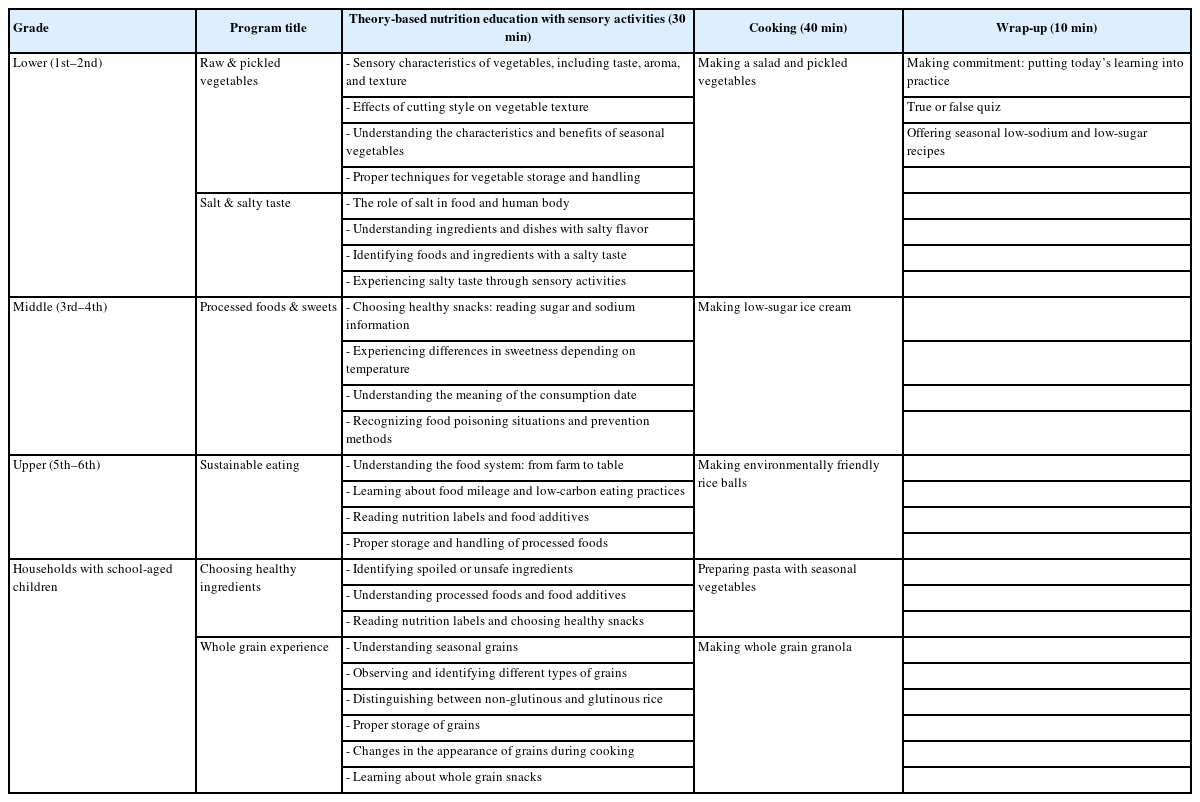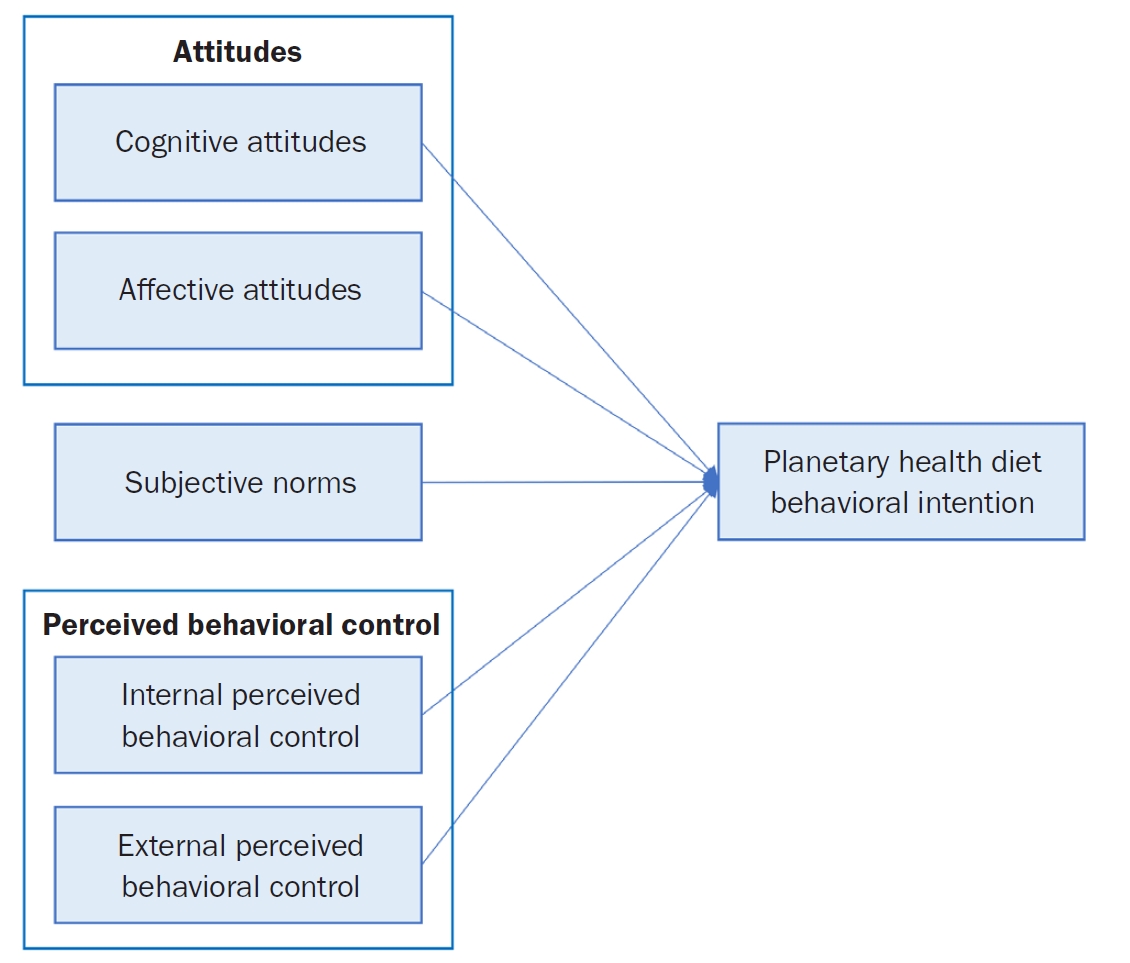- [English]
-
Pilot evaluation of a cooking-based nutrition education program to promote vegetable intake among children in Seoul, South Korea: a single-group pre–post study
-
Sil-Ah Kim, Su-Jin Lee, Min-Ah Kim, Ji-Eun Oh, Sohyun Park, Hyun-Joo Ryou, Ji-Yun Hwang
-
Korean J Community Nutr 2025;30(4):249-260. Published online August 29, 2025
-
DOI: https://doi.org/10.5720/kjcn.2025.00220
-
-
 Abstract Abstract
 PDF PDF PubReader PubReader ePub ePub
- Objectives
Food neophobia in children is often associated with limited exposure and familiarity to some foods. Cooking-based nutrition education (CBNE), which promotes acceptance through direct experience, may support the development of healthy eating habits. This study aimed to develop and implement a standardized CBNE program for school-aged children in Seoul, South Korea, and to evaluate its effectiveness by assessing changes in raw vegetable intake. Raw vegetable intake is an early indicator of the effectiveness of nutrition education on diverse topics in promoting healthy eating habits.
Methods
A single-group pre–post study was conducted with 37 children aged 6–11 years who participated in a 2-day CBNE program in October 2023. The participants completed pre- and post-education questionnaires and raw vegetable intake assessments. Four low-preference vegetables (bell pepper, carrot, cucumber, and tomato) were selected and served raw (25 g each) before and after the program. Intake changes were analyzed using paired t-tests, and Pearson’s correlation and hierarchical regression analyses were performed to identify predictors.
Results
Total raw vegetable intake significantly increased post-education (P = 0.008), particularly for carrots (P = 0.023). By subgroup, raw vegetable intake significantly increased in girls, upper-grade students, and those who consumed four or more vegetable side dishes per meal. Hierarchical regression analysis revealed that while vegetable preference was initially significant, vegetable-related experiences (β = 0.395, P = 0.026) and diversity of vegetable side dishes per meal (β = 0.403, P = 0.032) were stronger predictors in the final model (adj R2 = 0.333).
Conclusion
The CBNE program may enhance vegetable intake in children. Although preference remained the strongest individual factor, vegetable experience and the diversity of vegetable side dishes per meal had a greater combined effect. These findings underscore the importance of repeated and diverse exposure, not only by supporting previous studies that link such exposure to increased intake but also by suggesting that environmental support may be essential for sustaining healthy eating habits.
- [Korean]
-
Behavioral intention toward planetary health diet among adult users of government worksite cafeterias in Seoul, South Korea: a mixed-methods study based on the theory of planned behavior and focus groups interviews
-
Ji-Won Kang, Su-Jin Lee, Sil-Ah Kim, Ji-Yun Hwang
-
Korean J Community Nutr 2025;30(3):224-236. Published online June 30, 2025
-
DOI: https://doi.org/10.5720/kjcn.2025.00108
-
-
 Abstract Abstract
 PDF PDF PubReader PubReader ePub ePub
- Objectives
To reduce urban carbon emissions, in this study, we aimed to suggest strategies for disseminating the planetary health diet (PHD) guidelines to adult cafeterias in a government worksite in Seoul based on the theory of planned behavior (TPB) and focus group interviews (FGI).
Methods
A total of 132 adults who worked at a government worksite in Seoul and used its cafeteria were included for a TPB-based survey. Factor analyses and multiple regression were used to investigate the relationships between attitude (cognitive•affective), subjective norms, and perceived behavioral control (PBC, internal•external) and the behavioral intention to adopt the PHD. To identify the contextual factors related to PHD dissemination, 14 participants underwent in-depth interviews.
Results
Affective attitudes and PBC (internal•external) constructs of the TPB were significantly related with the intention to adopt PHD: external PBC (β = 0.324, P < 0.001), internal PBC (β = 0.269, P < 0.01), and affective attitudes (β = 0.226, P < 0.05). The FGI results highlighted the insufficiency of simply providing healthy meals to encourage the adoption of PHDs, but that menu development and natural acceptance strategies are needed to increase palatability. In addition, the need for strategies to promote PHDs at an organizational level was identified, as it is directly influenced by the company of partners with whom one dines. Furthermore, users' perceptions of how “Meals for the Planet” are delivered and suggestions for its improvement were also interpreted.
Conclusion
Our results suggest that users' beliefs, convictions, and emotions are important while promoting or educating individuals about sustainable PHDs. Our findings are expected to help local governments or private group cafeterias that wish to introduce PHDs in the future, given the growing importance of environmentally conscious eating.
|








